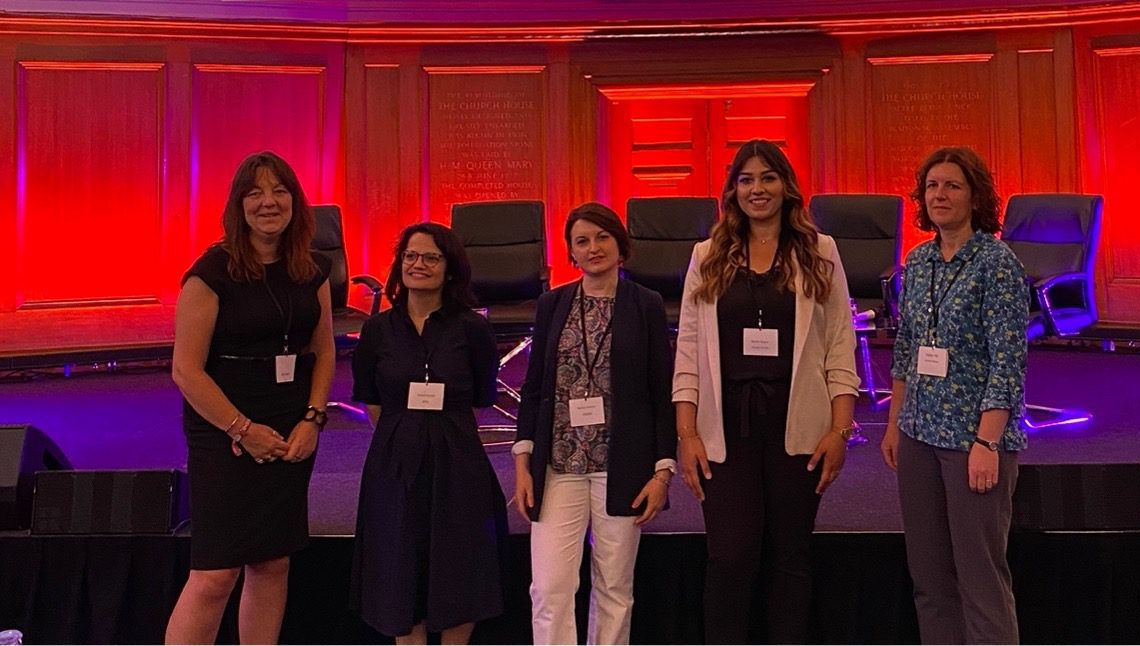Transforming Foundation Industries at Materials Research Exchange 2022

2050 is now! At Materials Research Exchange 2022, there was a clear urgency about the need to transform the foundation industries (cement, metals, glass, paper, ceramics and chemicals) if we have a hope of meeting our Net Zero targets.
Mike Biddle (Executive Director, Net Zero, Innovate UK) said in the opening of Materials Research Exchange (MRE), in relation to achieving Net Zero, “Time is our enemy”. That said, the UK has a huge opportunity to prosper from “being the fastest transitioning economy to Net Zero”. The foundation industries are critical to achieving this goal, which is reflected in his announcement of a new £19.5m Innovate UK award – Economic Material Innovation for Sustainable and Efficient use of Resources (ECONOMISER). The award is to support innovations in carbon reduction, process improvement and product development across foundation industries.
TFI Plenary – 2050 Foundation Industries is NOW
The sense of urgency underlay all the Transforming the Foundation Industry (TFI) sessions at MRE, which were opened by Bruce Adderley (TFI Challenge Director) under the title “2050 is now”. With a total of £149m, £66m of which is government funding, the TFI Challenge programme has brought together six sectors to deliver:
- Construction of an open-access glass production facility
- Over 60 R&D projects including 140 organisations
- TFI Network + – University led technology transfer hub
- TransFIRe – An Industry led technology transfer hub
- An investor partnership programme to provide additional support to innovative companies
However, as Bruce also said, there is “more to do and ever so quickly”. For example, in the brief poll run during the event, 45% of respondents had not heard of the TFI Challenge before. Therefore, we need to continue building the community and awareness of the foundation industries. This cross-sector challenge, though, has encouraged collaboration across supply chains, which is critical to solve the challenges.
In the next presentation, Cheryl Anderson (Head of Innovation & External Networks at Tata Steel), emphasised the need to work more closely together, particularly with customers, to solve the challenges of the future. Their demand is changing to consider the life cycle of the products and how circular economy principles can be adopted. This view aligns with two reports commissioned by the TFI Challenge into the construction and packaging sectors and was addressed by the New Demand session which followed the Plenary. Cheryl provided several examples where Tata Steel is addressing this changing customer demand.
Professor Steve Evans (Director of Research in Industrial Sustainability, Institute for Manufacturing, University of Cambridge) continued with the theme of collaboration. While he is optimistic about the future, he was clear that transformation of the foundation industries was necessary for their survival. He presented 5 scenarios of the future, whereby the only scenario in which the industry retains control is where industry drives the transition itself. For this to be the case, the industry must be proactive and work together. However, according to Steve, the visions from industry haven’t changed in the last two years; only the sense of urgency has increased. As he concluded: “The fear of inaction is now greater than the fear of action”. This view is perhaps reflected in the poll of the audience in which only 10% of respondents have clear plans in place to reach Net Zero by 2050. The majority (60%) are now making plans. It is starting to be recognised that those that do not act fast enough will be left behind.
New Demand – Why do the industries need to transform?
As we heard in the Plenary session, the customer demand from the foundation industries is changing to address organisational Net Zero targets. This was the topic of the panel discussion chaired by Ben Walsh (Deputy Director of TFI Challenge) with Geoffrey Scamans (CSO of Innoval Technology Limited), Jude Allen (Chair of IOM3 Packaging Society) and Su Varma (Academic Director, R&D Incubator at NSG Pilkington).
In an interesting discussion, the panellists demonstrated their knowledge and experience in the industry. Due to end-users’ perception and legislative drivers, customers want to reduce their carbon footprint. In order to achieve this though, more collaboration is required along the supply chain. As Geoffrey Scamans pointed out, recycled aluminium has a far lower carbon footprint than primary aluminium, however, a large proportion of end-of-life aluminium is exported out of the UK rather than recycled. Su Varma echoed this stating that in the construction sector, the glass is not recovered to be recycled. Jude Allen said that initiatives like the Extended Producer Responsibility in packaging have encouraged joined up thinking along the supply chain. In many cases, customers of foundation industries have very ambitious Net Zero targets without a clear path to achieve them so there is a great opportunity for the industries to provide solutions. It was agreed that identifying opportunities will require new ways of thinking including new people, for example, designers. As Su Varma put it, there is “huge benefit to going outside of your school”. Showing the customers what is possible will help exploit these opportunities.
Hackathon – Constructing future social housing
Collaboration between materials engineers and designers was the purpose of the Hackathon, run by the Materials and Design Exchange (MaDE) during MRE and sponsored by the TFI Challenge. Two interdisciplinary groups of students were set the challenge to identify potential solutions to construct social housing that requires less energy and resources, is fast to build and low cost. The outcome was two well delivered presentations demonstrating how diverse teams can generate innovative solutions.
New Players – How will they transform?
It was clear from the New Demand session that communication and collaboration with New Players is required to transform the industries. These New Players include those that provide new technologies, new skills and new perspectives. This was the subject of a thriving and wide-ranging panel discussion involving Nantas Nardelli (CarbonRe), Nicole Agba, Beverley Gower-Jones (Carbon Limiting Technologies), Gilda Gasparini (Lucideon), Liz Gilligan (Material Evolution) and chaired by Savina Venkova (ReLondon). It was recognised that the reputation of the industries is not the most attractive to draw in new talent. The industries need to represent how important they really are. For example, the building around us was a ‘cathedral’ to the foundation industries, constructed of glass, steel and cement. The industries should take lessons from other industries, e.g. tech companies who also have an important part to play in transforming the industries and were represented by Nantas from CarbonRe on the panel. To change public perception, the industries need to showcase their developments to the wider public but also to other stakeholders. Demonstrating proof of concepts will ‘change the art of the possible’, de-risking innovation and accelerating transformation.
New Models – What will the transformation look like?
Savina Venkova opened this session with a plot of the price indices of raw materials over the last decades. It showed that since 2005, prices of these resources are increasingly volatile as they become more scarce and depend on fragile geo-political circumstances. New modes of operation and business models must arise to reduce dependency on these resources and identify new value opportunities.
The challenge can be understanding the flow of these resources and the associated energy. Natanael Bolson (Transforming Foundation Industries Research and Innovation Hub) presented his work to map these flows and therefore identify the best opportunities. For the steel sector, there is the potential to reduce energy consumption by 15% by adopting best practice.
Another opportunity, as presented by Peter Labourn (Chief Executive, International Synergies Limited), is through Industrial Symbiosis. Peter outlined the benefits of this approach punctuated with several case studies including a metal finishing company that turned a landfill cost into a revenue stream.
Asha Panchal (Technical Manager, Keltbray) provided an example of how construction is rethinking design to reduce resource consumption. By changing the design of piling for foundations, less material is required and the piles can be interrogated at the end of life to be potentially reused rather than discarded in the ground. In one case study at HS2 in London, the concrete use was reduced by 41%.
The digital transformation can support new models by rethinking the value of materials, as explained by Prof. Roger Maull (Academic Director, INDEX). Traditionally, the value of material has been defined in exchange and inevitably the value of the material reduces as it gets used after the exchange. Increasingly, the value is being defined in use. For example, a future fridge could be more valuable as a data capture device (for supermarkets) than a refrigeration device (for an individual). Through fundamentally rethinking the purpose of any material, its value can be maintained for longer.
Summary
The TFI sessions at Materials Research Exchange outlined the urgency of the transformation of the foundation industries, led by New Demand, shaped by New Players and enacted through New Models. According to the poll, over 60% of participants left with new ideas, contacts or actions to address Net Zero and all agreed or strongly agreed the sessions were engaging and relevant. There was a wealth of information shared, too much to contain in a single article, so please get in touch with our Materials team for further information, and subscribe to our newsletter (click the “Sign Up” link at the bottom of this page) to receive regular updates on the TFI Challenge.
Related programmes

Women Innovators in the Foundation Industries (WINFI)
On International Women in Engineering Day 2022, the Innovate UK Business Connect Materials Team and the Transforming Foundation Industries Challenge launched the Women Innovators in Foundation Industries (WINFI) programme.

Circular Economy Innovation Network
The Circular Economy Innovation Network aims to enable stronger, more resilient industries working together, connecting, collaborating, and sharing experiences to achieve Net Zero through circular innovation.

